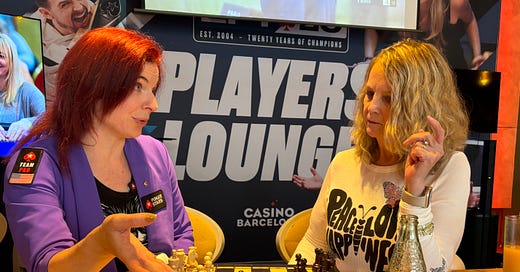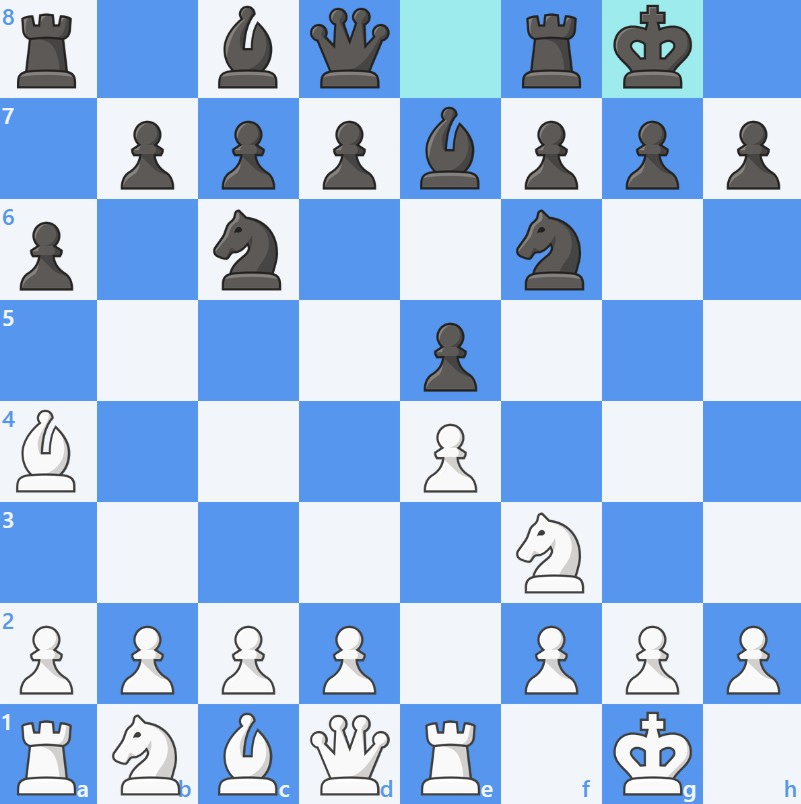The King's Gambit, or Queen Jack in the Hijack
I give GRID guest Judy Whitlow a lesson in preflop ranges
Lately my personal mission has clarified. I want people to feel smarter via games. Of course, I also want them to be smarter too, but A. naturally leads to B. To feel your brain working in new and exciting ways is addicting, and makes you want to study and do more so that you can replicate the feeling. It’s often a click: a chess puzzle solved, a poker concept snapping into place.
What does not make people feel smart, in my experience, is struggling to remember preflop ranges or chess openings. It’s the opposite of flow. I worry about the focus on memorization1. Plenty are doomed to fail, then beat themselves up—or enter denial, avoiding analysis because it may expose what they forgot. This is destructive both to the power of games to make people feel smart and empowered, and also to their actual level. I sometimes tell students, “Not remembering the opening at all is better than half-remembering it.”
Consider the chess position below. Black just erred by castling, instead of playing 6…b5, the Main line Ruy Lopez which has been played in tens of thousands of master games.
Imagine playing 7.Bb3 anyway because you know 7. Bb3 is the “Main Line” after 6…b5. But your bishop isn’t even attacked—and you could have just won a pawn with 7.Bxc6 dxc6 8.Nxe52.
This may look like an absurd case to you, but 7.Bb3 has been played in thousands of online games3. I see versions of this all the time. Students are capable of finding the best move, if they were thinking instead of trying to recall. When you work so hard, only to play worse, it’s a brutal lose/lose feeling. You may recognize this beyond chess and poker. A common example is preparing for a speech or presentation. When your preparation is in a murky middle zone, you aren’t smooth OR natural: and that’s when you bomb.
Tournament poker ranges are even less realistic to memorize than chess openings, because there are so many data points. It would be more like memorizing Freestyle Chess openings.4 Preflop poker ranges are in flux based on the stage of the tournament, who you’re playing against and stack sizes around the table. It’s impossible to “memorize” it all. Even if you were able to memorize a series of charts for what to do against a certain size, as soon as that size changed, it would be a new set of charts.
And despite this, studying and yes, even memorizing openings and preflop ranges can be worth it, but only if you’re clear on your goals. One is to understand the “why” so you can adjust on the fly. In poker, maybe you memorize a set of ranges as goal posts, so that you can improvise better. My personal favorite reason for memorizing openings and ranges is to reduce cognitive load. You will always be in a chess opening; you will always get two cards to start a No-Limit Texas Hold'em hand. Having more default knowledge means you can spend more brain power on everything else. Enjoying yourself and relaxing can be a byproduct of good preparation.
And this is the thinking that went into my recent preflop poker lesson with Judy Whitlow, which I present an excerpt of below. 5
For more with me and Judy, check out her GRID appearance, where we spoke about a hand she played on the European Poker Tour in Monte Carlo with pocket sevens. Judy is 77 so swears that this must be her lucky hand! I wouldn’t bet against it—or her.
For chess improvers and enjoyers, Nate Solon’s substack has a lot of great content on chess & memory.
This is possible because White’s previous move, Re1 protects the e-pawn.
The large majority must be pre-moves. But unless it’s a one minute bullet game, that’s not a great excuse.
Also known as Fischer Random Chess, or chess 960, Freestyle chess means scrambling the pieces on the back row before play.
Technical note: This particular lesson intentionally removed the possibility of limps.







It’s easy to think of solvers and chess engines as these robotic things, but for me it can highlight human creativity,